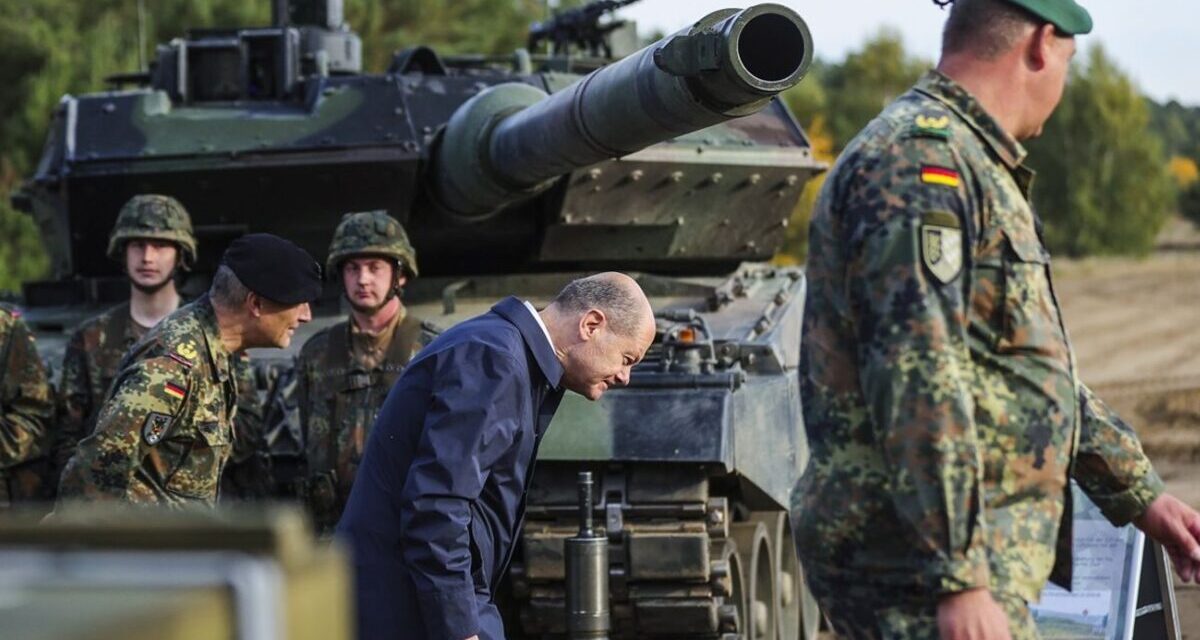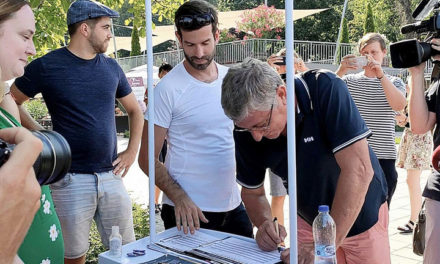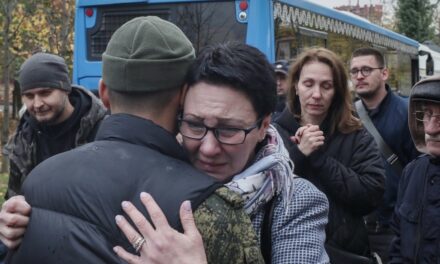It is possible that Germany will again send troops to the endless Russian borders. Written by Zsolt Ungváry.
In connection with his visit to the former (and hopefully future) American president, Prime Minister Viktor Orbán pointed out that he and Trump are primarily being attacked because they are pro-peace. The warmongers now want to lead Europe into another world conflagration, as they have already done twice.
Macron diverts attention from suspicions about his wife's transgenderism with the idea of sending NATO troops to Ukraine, the ex-soldier Czech president's rifle bullets itch, and the Polish prime minister announces with noble simplicity: "The time for peace is over. The post-war era is over".
The Poles, if they are not divided among the surrounding great powers, suddenly lose their sense of reality.
For a long time I didn't understand the pictures - I thought they were just communist propaganda - of crowds marching in 1914 "Long live the war!" with signboards. Now politicians are doing the same, and while with the victory of individualism, the value of the individual supersedes everything else, in a completely senseless, inexplicable war, the guilty Neros would casually throw their citizens there.
Primarily, of course, the less valuable Eastern and Central European ones; this classification of more important, less important and expendable people is familiar from somewhere.
Instead of bringing order back home, it is much easier to push the continent marching towards anarchy into a chaotic world fire, and then, on the cleaned page, draw a new world order according to the taste of the current winners.
It is not impossible that Germany, once again finding itself at the center of events, will once again send troops to the endless Russian runes, because this promises to be easier than creating internal harmony.
Whatever stereotypes we may have about the efficient Germans, the fact is that despite their many valuable qualities – economic and cultural potential – they are unfit for state organization.
The loose confederation of numerous small principalities, kingdoms, counties and duchies called the German-Roman Empire in this country was actually the Holy Roman Empire of the German Nation - Heiliges Römisches Reich Deutscher Nation - i.e. the successor of the former Roman Empire. For the first time, in 1871, the (partial) unification of the German territories succeeded in creating what is now undoubtedly a German country, but this quickly led to a world war.
In revenge after territorial losses and humiliation, the Third Empire was first born, and after another world war it was divided directly into two parts.
And when they united again in 1990 - with no small help from Hungary - this time they needed more than thirty years for the nation-state type of country-building to fail again and their attention to turn completely to empire-building, not even having finished with the EU (which is now the umpteenth an attempt to resurrect the Western Roman Empire), but they began to wink at Eastern Rome, i.e. Byzantium, i.e., since its fall, towards Moscow, so that the era of the SPQR under the rule of the Kaiser would once again usher in.
We don't know who the Kaiser is this time and what he wears on his head. But when it's all over, maybe it will be revealed.
In any case, the Germans seem to have gone mad again, but while in 1941 at least retaining the territorial gains could have motivated us to join the alliance, now there is no reason on earth to participate in it.
By the way, there are nations that are capable of state organization, that is, of maintaining a functioning country in a specific area. The former Kingdom of Hungary, although within changing borders, for a thousand years, has always been able to present a state structure managed by a central authority, which continuously maintains its cultural, legal and constitutional traditions.
Behind our freedom struggles there was always a structural, thoroughly modified sovereignty.
Rákóczi's principality, his senate, his own money, international relations or Kossuth and Deák's public law references rooted in Hungarian history provided the basis for future independence.
The Romanians and Slovaks did not create their countries as a result of a long and complicated state organization.
It did not happen that Romanian or Slovak autonomies were created, with a historical-cultural-legal-ideological background; independence was not achieved in freedom struggles with martyrs and passionate poets, referring to century-old statutes, but they were simply attached to Old Romania and the Czechs. (In Transylvania, the Hungarian county system has essentially been maintained in the public administration to this day, and the Slovaks created eight unwieldy districts so that the Hungarians could not be in the majority anywhere.)
The Russians, who are not our best friends - and whose leader, Putin, raised the stakes when he even suggested the use of nuclear weapons - sometimes treat us with a map on which Transcarpathia is annexed to us, perhaps trying to convince us that this is our war too. A significant problem is that our federal system is on the other side.
A special feature of Hungary is that there is always a current anti-drucker (to put it mildly) company here, who are offended if a small amount of territorial compensation arises.
These are always violated if anyone brings up the affiliation of our attached parts; they would prefer to divide the entire remainder, and they would have been the ones to hold back the horse of Károly of Lotharingiai, he should not want to ride into Buda, it has belonged to the Turks for 145 years, let's let him go, let's give him up.
The journalist of Népszava ironically mentions Subcarpathia on Medvedev's map, saying that we could get more as "Russia's most loyal European friends". Of course, we would never have such thoughts, since we don't tend to long for what others have, but we don't give up what is ours. Transcarpathia is part of the thousand-year-old Hungarian state, but Lemberg or Berezsani (this is the Brezán, from where Rákóczi called the Kurucs to war in 1703 - then still from Poland) are no longer.
We don't want colonies, we don't claim Naples (despite Louis the Great's campaign in vain), or Boroszló (although Mátyás occupied it), but from Brasó to Bratislava, from Ungvár to Lendva, this is Hungarian land, no matter how you draw the lines on the map.
However, these questions did not arise in connection with this war, and even if they did, we know that we are more successful in peaceful construction than in wars. Therefore, all domestic political groups must work with all their might to ensure that we, if possible, avoid the expansion of the armed conflict.
It would be good to focus primarily on this, instead of high-profile politicians (Péter Magyar) and Opera House sandwiches.
Cover image: Olaf Scholz hinted: it is possible that Germany will send troops to Russia again
Source: MTI/EPA/Friedemann Vogel












